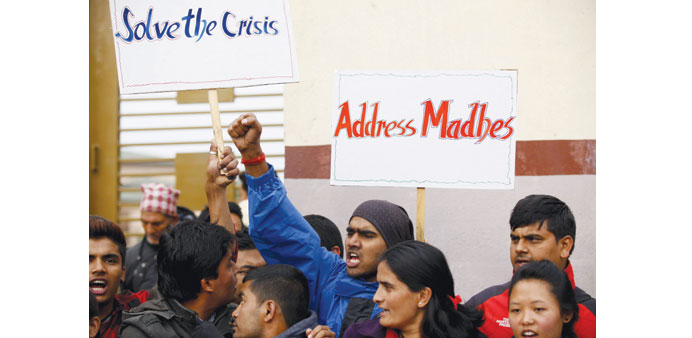Nepalese people with placards protest and shout slogans during the “Citizen March to Parliament” in Kathmandu. The programme was organised to pressurise the government about the current situation in Madhesi and to address the need of earthquake survivors.
IANS
Kathmandu
Accusing India of imposing a blockade against land-locked Nepal, two Leftist parliamentarians yesterday demanded that New Delhi’s envoy to Kathmandu be sent packing from the Himalayan nation.
Lawmakers Prem Suwal and Anuradha Thapa Magar of the Nepal Workers and Peasants Party (NWPP) raised slogans against Indian ambassador to Nepal Ranjit Rae, holding him responsible for the almost three-month-old blockade along the India-Nepal border.
“Who is India to interfere in Nepal’s constitution? No one can disintegrate the nation! Send the Indian ambassador back to India,” were some of the slogans that the protesting lawmakers chanted.
They also demanded action against Indian police who, they claimed, opened fire at four Nepali nationals last week.
The House was later adjourned after members of the agitating Madhesi-based political parties also raised slogans demanding that their demands be addressed.
The Madhesi-based political parties and ethnic groups have been agitating in Nepal’s southern plain for almost three months to press their demands that include re-demarcation of provinces proposed in the country’s new constitution - adopted on September 20, fixing of electoral constituencies on the basis of population and proportional
representation in parliament.
The often violent agitation has so far claimed at least 50 lives and blockaded vehicular movement between Nepal and India - resulting in scarcity of essential commodities of daily use including food items, fuel and
medicines.
While Nepal blames India for the blockade, New Delhi maintains that the situation is of Kathmandu’s own creation and could be addressed through meaningful dialogue with the Madhesi-based protesting groups who want that the new constitution should be amended.
Unrest over Nepal’s new constitution has led to severe shortages of fuel, food, medicines and vaccines, putting more than 3mn children at risk of disease during the harsh winter months, the UN children’s agency Unicef has said.
Nepal has been in turmoil since September when it adopted a new constitution, sparking protests by members of the ethnic Madhesi groups, who argue that the country’s charter does not reflect their
interests.
Protesters have blockaded trucks from India, leading to acute shortages of fuel and medicine in the landlocked Himalayan nation of 28mn people.
Unicef said child survivors of two major earthquakes in April and May could be worst hit by the shortages. The tremors killed nearly 9,000 people and damaged or destroyed nearly 900,000 houses. Many remain homeless.
Newborn babies are at particular risk, as fuel shortages mean fewer women can get to hospitals and health centres to give birth, Unicef said.
“The plight that children and their families are facing in the country has been worsening by the day and will deteriorate further in the winter months,” Unicef’s regional director for South Asia, Karin Hulshof, said in a statement.
“There is no time to lose,” she added.
The fuel shortage has led to an increase in the use of firewood in homes, which raises the risk of pneumonia. More than 800,000 Nepali children under five contracted the illness last year, and around 5,000 died, the agency said.
The government’s regional medical stores have already run out of BCG vaccines against tuberculosis, and stocks of other vaccines and antibioticsare critically low, Unicef said.
“The risks of hypothermia and malnutrition, and the shortfall in life-saving medicines and vaccines, could be a potentially deadly combination for children this winter,” Unicef’s executive director, Anthony Lake, said in a statement.
“During my recent visit to Nepal, I witnessed first-hand the precarious living conditions of many of the earthquake survivors,” he added.

